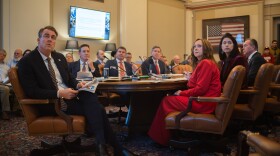Oklahoma legislators will be heading back to the state Capitol again this fall to consider three items on Governor Kevin Stitt's agenda.
TRANSCRIPT
Dick Pryor: This is Capitol Insider - taking you inside politics, policy and government in Oklahoma. I'm Dick Pryor with Quorum Call publisher Shawn Ashley. Last Monday, Governor Kevin Stitt filed an executive order calling for another special session of the legislature. He wants lawmakers to return October 3rd and take action on three items. Shawn, let's reestablish those first.
Shawn Ashley: Stitt asked the legislature to consider a trigger law mandating that if a state or federal court finds that some individuals due to their race, heritage or political classification don't have to pay a particular state tax, then no Oklahoman will have to pay that tax either. He's also asking them to consider an income tax cut that puts Oklahoma on the path to zero income taxes. And finally, he's asking them to adopt a budget transparency measure that gives Oklahomans and their elected representatives the opportunity to see more clearly how their taxpayer dollars are being spent.
Dick Pryor: There will be a legislative session beginning in February. Why is the governor not waiting to push tax cuts at the top of his agenda then, and is instead calling a special session to address them now?
Shawn Ashley: Well, first of all, a tax cut passed during the special session likely will take effect January 1st, 2024, rather than January 1st, 2025, if it is passed during the next regular session. And if that is the case, it could reduce the fiscal year 2025 revenue estimate that will be considered first in December and finalized in February and subsequently the FY 2025 budget that lawmakers will write during the 2024 legislative session. In other words, it could reduce state spending. And finally, Stitt has called for income tax reductions since he first took office in 2019, but he’s signed only one income tax cut that came in 2021. After lawmakers failed to pass an income tax cut during the 2022 session, he called them back in the special session for just that purpose, but he was unsuccessful when the House passed a series of bills that the Senate ultimately did not take up.
Dick Pryor: As far as legislative transparency, these kinds of open government concepts have been suggested before, but rarely, if ever, go anywhere. Is there sentiment in the legislature to do what the governor wants?
Shawn Ashley: Well, it really depends on who you talk to. Republican budget writers who are in the majority will tell you that the current process is transparent. It begins with the agencies filing their budget requests now and those budget request hearings that subcommittees hold at the start of the legislative session. And then finally, of course, the consideration of the budget bills by the full legislature. Democrats, however, see it differently and have advocated for some of the same proposals Stitt outlined in his special session call. Even some rank-and-file Republicans, those not in the room when the budget negotiations take place, have complained about the budget process as well. And let's not forget, Stitt, a Republican, has complained about the process. In 2022, for example, he said he and his team were excluded from the budget writing process. And then again this year he expressed concern about lawmakers spending one time revenue for recurring or ongoing expenses.
Dick Pryor: The third item on the special session call - the statutory tax exemption trigger - appears very transparent. It looks like another way to gain a public relations edge over Native American tribes in the state. Agree?
Shawn Ashley: Oh, yes. Stitt has been calling attention to what is known as the Strobel case for several months. At issue is whether tribal citizens who live within reservation boundaries and are employed by tribal businesses have to pay state income taxes. At a July press conference, Stitt noted the Five Tribes have filed an amicus brief with the Supreme Court supporting Strobel’s position. While Stitt said he did not begrudge them that position, that he would do the same thing in a similar position. The governor said he had to think about all Oklahomans and the potential impact the decision could have across the state, and particularly on the state budget.
Dick Pryor: House Speaker Charles McCall and Senate President Pro Tem Greg Treat had notably different responses to the governor's call for a special session.
Shawn Ashley: “We need real answers,” Treat said, and asked “what schools is he going to close? Which public safety programs are we going to cancel? Are the tax credits that we just passed for school choice - are we going to rescind some of those?” Treat said Stitt’s special session call was intensely vague, but McCall called it fairly specific and said,”I don't think it's going to be a hard issue for the House of Representatives at all. We've passed multiple tax cutting measures in the last four sessions.”
Dick Pryor: Thanks, Shawn.
Shawn Ashley: You're very welcome.
Dick Pryor And that's Capitol Insider. For more information, go to quorumcall.online. You can find audio and transcripts at kgou.org and listen to Capitol Insider where you get your podcasts. Until next time, with Shawn Ashley, I'm Dick Pryor.
KGOU is a community-supported news organization and relies on contributions from readers and listeners to fulfill its mission of public service to Oklahoma and beyond. Donate online, or by contacting our Membership department.
Copyright 2023 KGOU. To see more, visit KGOU. 9(MDA4OTAxNzAzMDEzMjc0MTc2MzA5ZDZlMw004))







